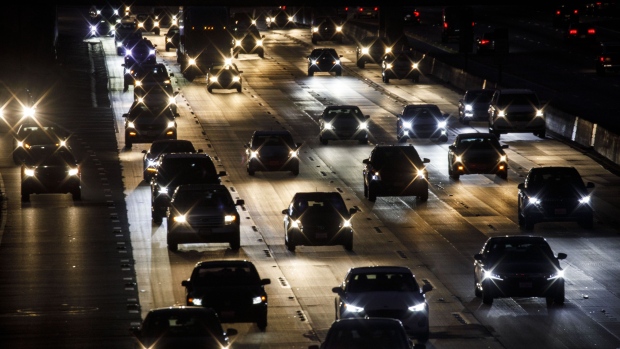Oct 29, 2019
GM, Toyota Side With Trump in Emissions Battle With California
, Bloomberg News

(Bloomberg) -- General Motors Co., Toyota Motor Corp. and Fiat Chrysler Automobiles NV plan to back President Donald Trump in a contentious battle with California officials over automobile emissions rules, splitting with major rivals including Ford Motor Co.
GM, Toyota and several other automakers plan to intervene on the administration’s behalf in a lawsuit filed by environmental groups challenging the U.S. Department of Transportation’s rule stripping California of its ability to regulate tailpipe greenhouse gas emissions.
The move was announced Monday by John Bozzella, a spokesman for the companies siding with the administration, who call themselves the Coalition for Sustainable Automotive Regulation.
California and more than 20 other states have filed suit to block the administration’s plan to revoke the state’s powers, a legal battle that threatens to tie up the critical industry standards in litigation for years with an uncertain outcome.
“With our industry facing the possibility of multiple overlapping and inconsistent standards that drive up costs and penalize consumers, we had an obligation to intervene,” said Bozzella, who is also chief executive officer of the Association of Global Automakers, an industry trade group. “The decision to intervene in the lawsuit is about how the standard should be applied, not what the standard should be.”
The Trump administration last year proposed to dramatically ease federal automobile greenhouse gas emission and fuel economy standards that had previously been coordinated with California. California officials rebuffed and vowed to continue to enforcing their more stringent standards, which are in place through 2025.
The move by GM and the other companies breaks with Ford Motor Co., Honda Motor Co., BMW AG and Volkswagen AG, which in July agreed to meet tougher emissions targets set by California. The automakers siding with the administration were harshly criticized by some Democrats, environmental organizations and California regulators.
Mary Nichols, chairman of the California Air Resources Board, said in a statement that the state regulator was disappointed in automakers “hiding behind the Trump administration’s skirts and its assault on public health.”
“California will continue to carry out our mandate to meet national air quality standards and keep working with those automakers committed to a framework that delivers cleaner vehicles that benefit consumers and the environment,” Nichols added.
Senator Tom Carper of Delaware, the top-ranking Democrat on the Senate Environment and Public Works Committee, said that “to say I’m disappointed is an understatement, especially given the number of times these companies have told me personally that they wish to avoid costly litigation and regulatory uncertainty.”
“Instead of choosing the responsible path forged by four automakers and the state of California, one that will move us toward the cleaner, alternative fuel vehicles of the future, these companies have chosen to head down a dead-end road,” Carper said.
Most automakers have urged officials in Washington and Sacramento for more than a year to compromise, but no deal materialized after limited talks broke down earlier this year.
Still, Bozzella said he held out hope for a middle ground. “We can still reach an agreement that is supported by all the parties,” he said.
Ann Carlson, a law professor at the University of Southern California at Los Angeles was skeptical about that possibility.
“‘By throwing their heft behind the Trump position that California lacks the authority to issue its own standards, GM and company are making it even less likely that California and the federal government will reach some sort of compromise,” she wrote in a blog post Monday.
To contact the reporter on this story: Ryan Beene in Washington at rbeene@bloomberg.net
To contact the editors responsible for this story: Jon Morgan at jmorgan97@bloomberg.net, John Harney
©2019 Bloomberg L.P.


